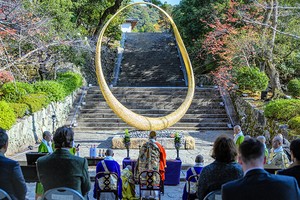July 20, 2022 at 19:32 JST
 The Tokyo metropolitan government building complex in the capital's Shinjuku district (Asahi Shimbun file photo)
The Tokyo metropolitan government building complex in the capital's Shinjuku district (Asahi Shimbun file photo)
Japan confirmed a record 152,536 new COVID-19 cases as of 6:00 p.m. on July 20, exceeding 150,000 for the first time, as record highs were reported in at least 28 prefectures, including Kanagawa and Osaka.
The number far exceeded the previous high of 110,675 cases recorded on July 16.
Daily records for new cases were set in at least 28 prefectures, including Aomori, Akita, Yamagata, Fukushima, Tochigi, Gunma, Kanagawa, Toyama, Fukui, Yamanashi, Nagano, Gifu, Shizuoka, Aichi, Osaka, Hyogo, Tottori, Shimane, Yamaguchi, Kagawa, Ehime, Kochi, Fukuoka, Saga, Nagasaki, Kumamoto, Oita and Kagoshima.
Osaka confirmed 21,976 cases, surpassing 20,000 for the first time. Kanagawa Prefecture logged 11,443 cases, reaching 10,000 for the first time.
Tokyo reported 20,401 cases on July 20, its third-highest daily figure. The previous high of 21,562 was set on Feb. 2 during the sixth wave of infections.
The figure exceeded 20,000 for the first time in about five months. The daily count in the capital was up 3,523 from the previous Wednesday.
The Tokyo metropolitan government reported the related deaths of four patients in their 70s to 90s.
In the capital, 43.5 percent of hospital beds for COVID-19 patients were filled, officials said.
The occupancy rate of hospital beds for severely ill patients stood at 13.6 percent. If the rate rises to 30 to 40 percent, that will be one of the criteria for the metropolitan government to consider asking the central government to declare a state of emergency for the capital.
The daily average of new cases in Tokyo for the week ending July 20 was 16,649.3, or 163.9 percent of the average of the previous week.
People in their 20s represented the largest age group of the new COVID-19 patients at 3,666, followed by 3,394 in their 40s, 3,300 in their 30s, 2,867 between ages 10 and 19, 2,450 in their 50s and 2,259 under the age of 10.
Additionally, 1,849 people aged 65 or older tested positive for the novel coronavirus.
The metropolitan government defines seriously ill patients as those requiring ventilators or ECMO lung bypass machines. The number of seriously ill patients in the capital was 18 on July 20, a decrease of one from the previous day.




















A peek through the music industry’s curtain at the producers who harnessed social media to help their idols go global.
A series based on diplomatic documents declassified by Japan’s Foreign Ministry
Here is a collection of first-hand accounts by “hibakusha” atomic bomb survivors.
Cooking experts, chefs and others involved in the field of food introduce their special recipes intertwined with their paths in life.
A series about Japanese-Americans and their memories of World War II